Review of samsung galaxy s21 ultra s21 ultra vs s21 ultra 5g s21 ultra vs s21 ultra 5g galaxy s21 ultra review galaxy s21 ultra features galaxy s21 ultra review galaxy s21 how to galaxy in real life why the hell are you here heres why the market might skip the here she comes again
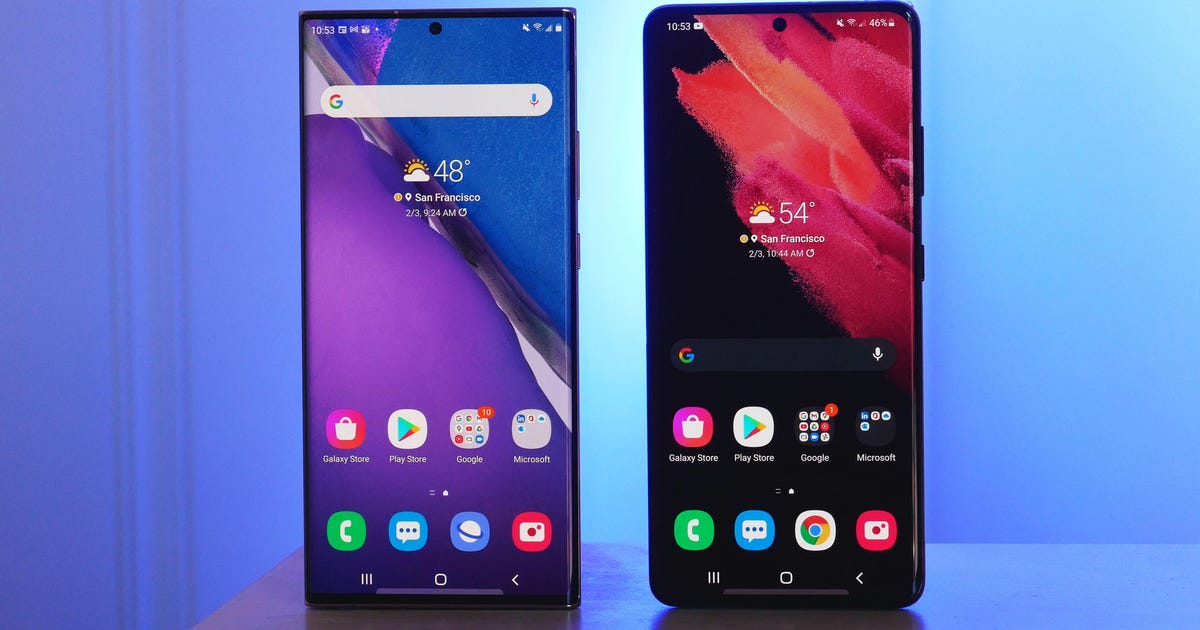
Here's why the Galaxy S21 Ultra beats Samsung's older Galaxy Note 20 Ultra
Samsung's made choosing a premium phone harder than ever with the Galaxy S21 Ultra and the Galaxy Note 20 Ultra, two similarly priced phones with similar specs released within six months of each other. Both have S Pen support, great zoom cameras and 120Hz refresh rate screens, and on paper it's hard to tell which one is the better buy. To find out, I used them side by side for two weeks comparing them in five different categories: displays, design, cameras, battery and performance.
The S21 Ultra feels easier to use one-handed
Both phones have a curved AMOLED screen, with the 6.9-inch Note 20 Ultra just edging out the 6.8-inch S21 Ultra in terms of size. The S21 Ultra is the heavier of the two phones, but I found it easier to use one-handed as the camera is balanced better compared to the domino-style camera module on the Note 20 Ultra.
Both phones are covered in the strongest version of Corning's glass, Gorilla Glass Victus, but since neither survivedour drop test, I'd highly recommend getting a case for them.
Better display options on the S21 Ultra
For things like gaming, scrolling web pages or watching videos, both displays will look incredible. They have a variable, or adaptive refresh rate of up to 120Hz, which means it's changing the refresh rate depending on what you're doing, like a higher rate for gaming, or a lower rate when the phone is standing by. But the S21 Ultra supports the highest WQHD Plus (1440p) resolution in 120Hz while the Note 20 Ultra only supports full HD (1080p) with the adaptive refresh rate. To get the highest resolution on the Note 20 Ultra, you'll need to drop to 60Hz or the standard refresh rate.
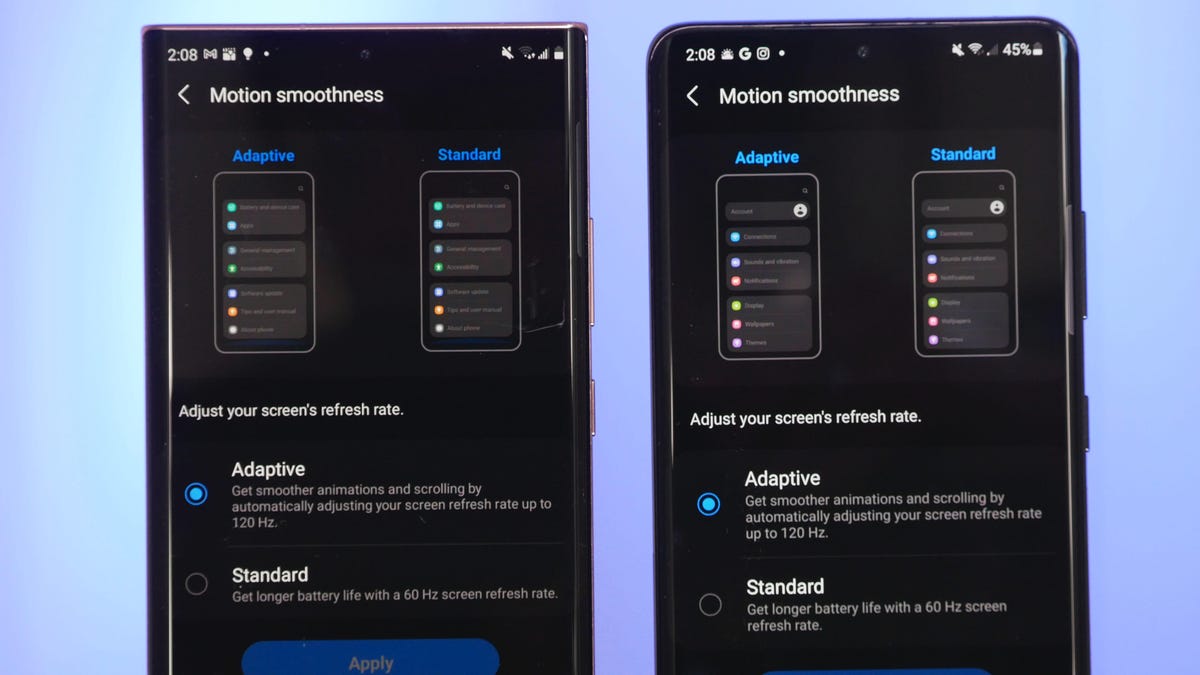
Both phones also have a fingerprint reader hidden under the display, and while I didn't notice that much difference between the two, anecdotally the S21 Ultra's sensor felt faster to authenticate and unlock the phone.
The S21 Ultra takes the camera crown
The S21 Ultra takes the already super-close zoom on the Note to the next level with two telephoto cameras: One that can optically zoom to 3x and the other 10x, offering more flexibility for photographers who want to get closer to the subject without physically moving closer. The Note 20 Ultra, by contrast, has only one telephoto camera with a 5x optical zoom.
I also noticed that Samsung has improved the image processing of zoom photos taken using hybrid (optical and digital) zoom, which is anything beyond the reach of the telephoto camera. Looking at the same 50x photo taken on both phones, the S21 Ultra's image is clearer and retains more detail compared to the Note 20 Ultra. You can get up to 100x on the S21 Ultra, but I never found myself using this extreme zoom because the image looks pretty mushy.
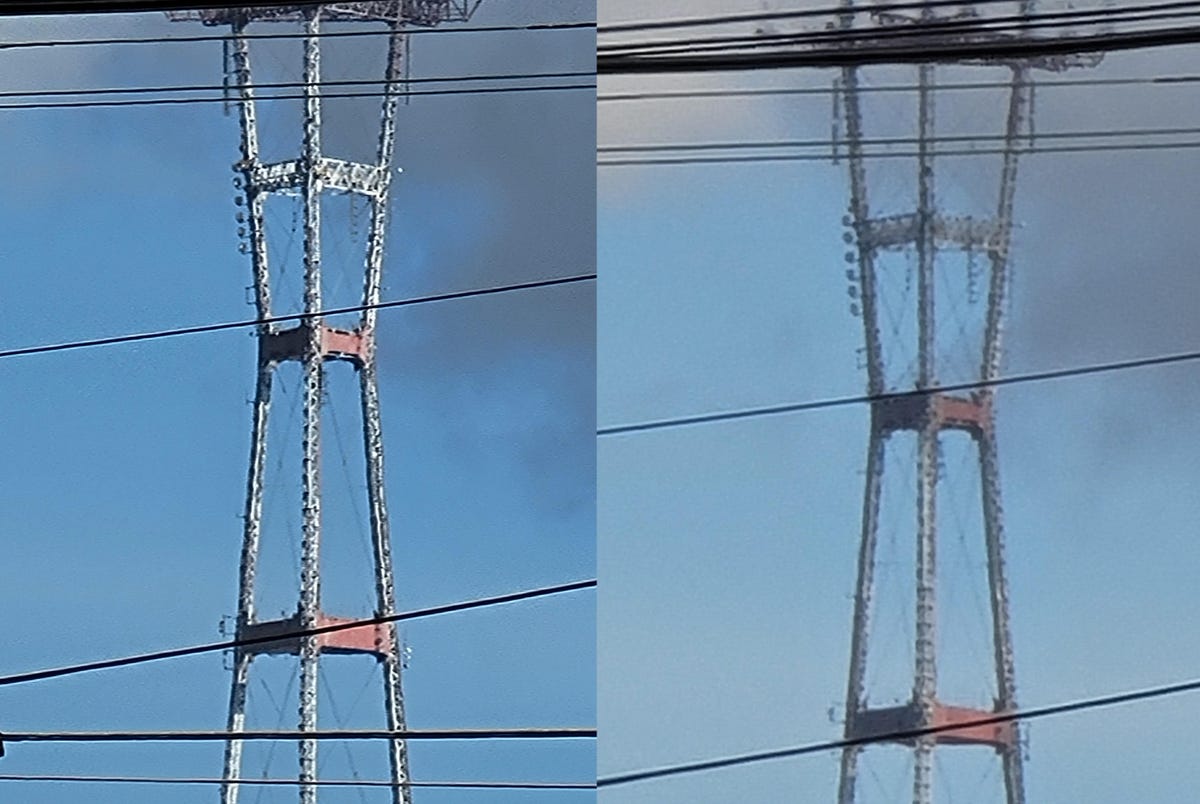
A comparison of 50x hybrid zoom on the S21 Ultra (left) and Note 20 Ultra (right).
Lexy Savvides/CNETGeneral photos of landscapes and scenery look great on both phones and I couldn't really tell them apart. The main wide-angle camera uses a 108-megapixel sensor on both phones which is useful for cropping after the fact, or making really large prints, but I found the regular 12-megapixel photos were great as well. Both phones use a technique called "pixel binning" on these regular shots that helps to retain lots of detail and good dynamic range.
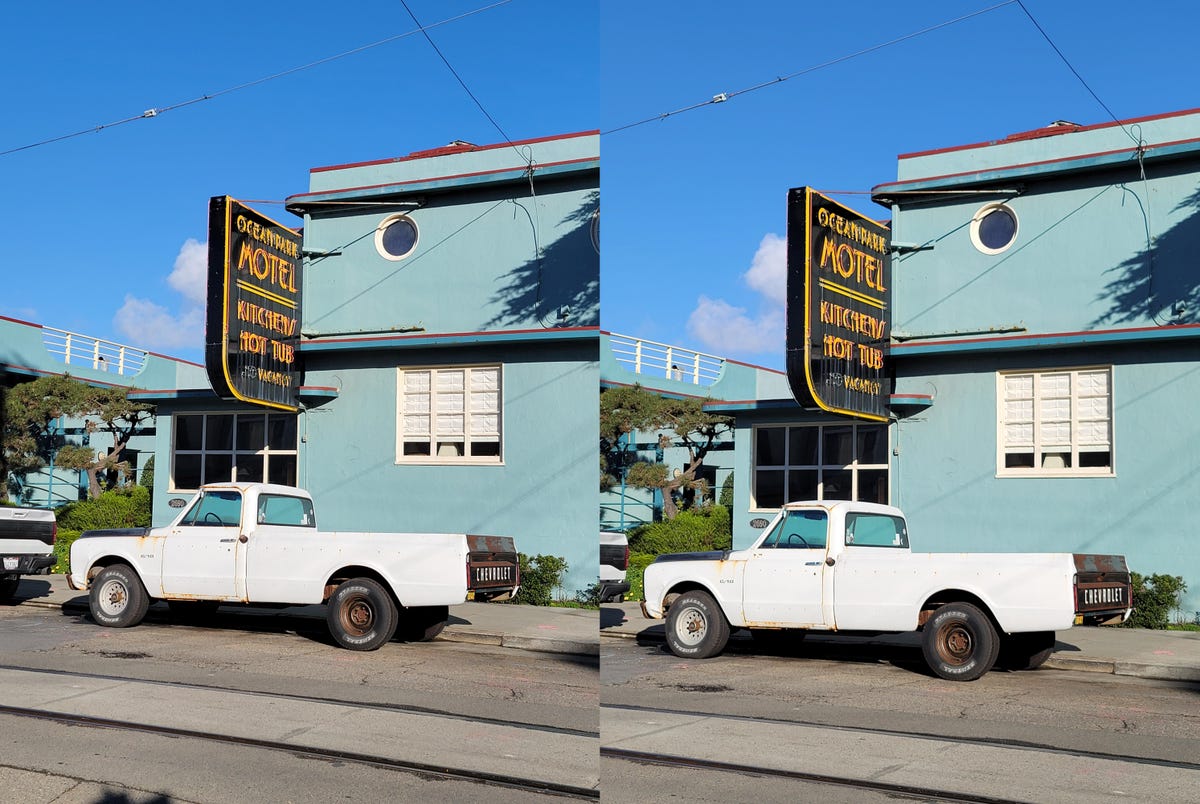
The S21 Ultra is on the left and the Note 10 Ultra is on the right. Spot the difference?
Lexy Savvides/CNETIn low light, I prefer the S21 Ultra, although night mode shots look more processed with greater contrast and less noise than photos taken on the Note 20 Ultra in the same light. Video quality is great on both, especially when filming at 4K. To my eye, the dynamic range is a touch broader on the newer phone, but I'd be very happy with either. The S21 Ultra has an advantage in that it can film on the telephoto camera at 4K/60, whereas the Note 20 Ultra can only use digital zoom at this resolution and frame rate. Both phones film in 8K at 24fps. You can see many more photo and video samples in the video on this page.
S Pen is better on the Note 20 Ultra
Many fans of the Galaxy Note series may have been concerned when they saw the S21 Ultra would support the S Pen, because it could potentially signal the end of the Note family of phones.
The S21 Ultra may be the first non-Note phone with stylus support, but the S Pen doesn't do quite as much as it can on the Note 20 Ultra, at least not just yet.
Both phones let you draw on the screen, take notes, annotate screenshots, convert handwriting to text or straighten your handwriting in the Samsung Notes app. The S Pen on the Note 20 Ultra also has Bluetooth support, which lets you use air gestures to open the camera or take photos remotely, to name just a few examples. The phone can also ping you if you leave the S Pen behind somewhere. And the Note can also store the S Pen inside the phone, unlike the S21 Ultra -- you can buy a separate case with a storage slot for the stylus, but if you're anything like me, you'd still lose the S Pen regardless of the case.
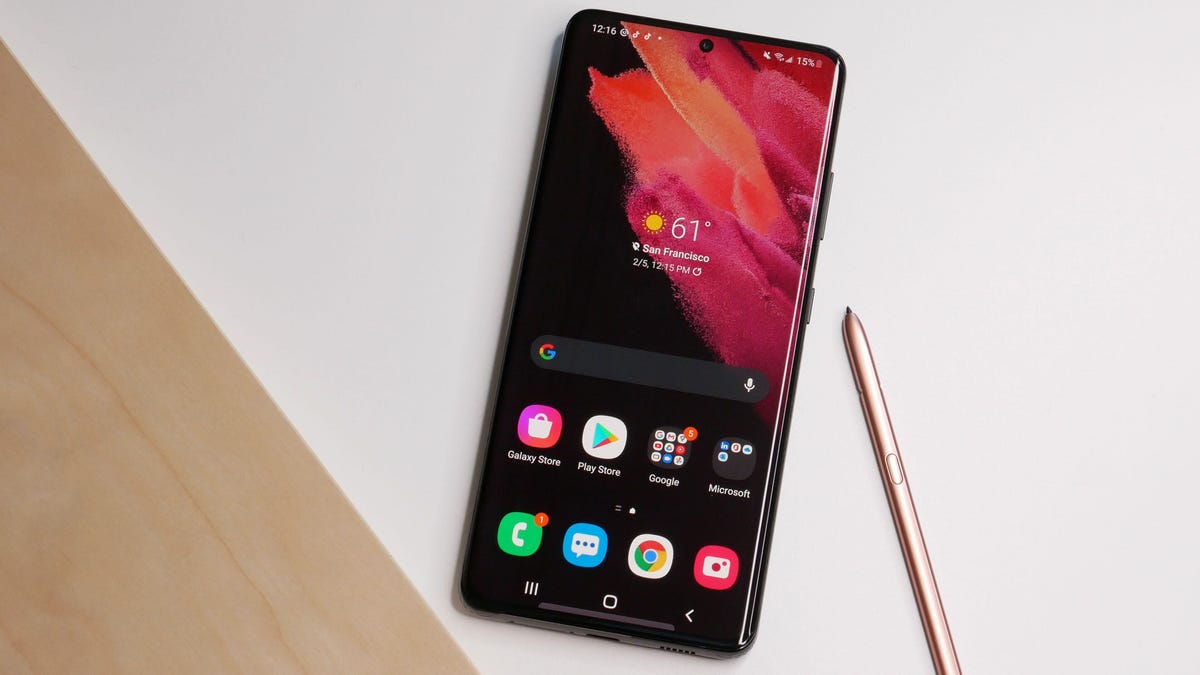
I couldn't notice much of a difference in terms of the performance of the S Pen when using it on the two phones side by side, but artists may be able to tell the difference, thanks to the 9ms latency on the Note 20 Ultra. Samsung will release an S Pen Pro later in 2021 that offers Bluetooth support to bring it more in line with the functionality on the Note.
Note 20 Ultra: Smaller battery, slightly longer life
The S21 Ultra has a 5,000-mAh battery compared to 4,500 mAh on the Note 20 Ultra, but a larger capacity battery doesn't automatically mean you'll get more juice out of the phone. Usage patterns, 5G connectivity, processing power and display brightness all play a part in overall battery life; I didn't see a huge difference in battery life between the two phones.
Both phones made it comfortably through a full day of use with juice to spare. At the end of the day of heavy usage running both phones at 120Hz, the WQHD Plus screen (on the S21), filming 4K video and gaming, I was left with anywhere between 10 and 15% battery on the Note, and around 10% on the S21 Ultra. Anecdotally, I felt that the Note 20 Ultra had better standby time overall when I wasn't using the phone. You can check out our full reviews of the S21 Ultra and Note 20 Ultra for results from our official battery test.

The base storage level on both phones starts at 128GB with the option to go up to 512GB on both, or an intermediate 256GB tier on the S21 Ultra, but only the Note 20 has the option to expand with a microSD slot. The S21 Ultra also misses out on the charger in the box, as well as MST support in Samsung Pay.
Depending on where you live, you'll either get a Snapdragon or Samsung's own Exynos processor. I've only tested the Snapdragon 888 on the S21 Ultra and 865 Plus on the Note 20 Ultra, so can't comment on Exynos performance, but both phones never left me wanting when it came to trimming 8K videos, gaming or running a myriad of apps at a time.
The Galaxy S21 wins, but not by much
In the end, I found that these phones share so many of the same features that it doesn't make sense to upgrade from the Note 20 Ultra to the S21 Ultra if you already have the (slightly) older phone. But improvements in the camera, S Pen support and a more balanced one-handed feel was enough to sway me to choose the S21 Ultra if I was looking for the best overall Galaxy experience.
Samsung Galaxy S21 Ultra vs. Note 20 Ultra specs
| | Samsung Galaxy S21 Ultra | Samsung Galaxy Note 20 Ultra |
|---|---|---|
| Display size, resolution | 6.8-inch AMOLED 2X, 3,200x1,440 pixels | 6.9-inch; 3,088x1,440 pixels |
| Pixel density | 515 ppi | 496 ppi |
| Dimensions (inches) | 2.97x6.5x0.35 in. | 6.49x3.04x0.31 in. |
| Dimensions (millimeters) | 75.6x165.1x8.9mm | 164.8x77.2x8.1mm |
| Weight (ounces, grams) | 8.07 oz.; 229g | 7.33 oz., 208g |
| Mobile software | Android 11 | Android 11 |
| Camera | 108-megapixel (wide-angle), 12-megapixel (ultrawide), 10-megapixel (3x telephoto), 10-megapixel (10x telephoto) | 12-megapixel (ultrawide), 108-megapixel (wide-angle), 12-megapixel (telephoto) |
| Front-facing camera | 40-megapixel | 10-megapixel |
| Video capture | 8K | 8K |
| Processor | Snapdragon 888 | Snapdragon 865 Plus |
| Storage | 128GB, 256GB, 512GB | 128GB, 512GB |
| RAM | 12GB, 16GB | 12GB |
| Expandable storage | No | Up to 1TB |
| Battery | 5,000 mAh | 4,500 mAh |
| Fingerprint sensor | In-screen | In-screen |
| Headphone jack | No | No |
| Special features | IP68 rating, 5G-enabled, 100x Space Zoom, 10W wireless charging, 10x optical zoom | 120Hz screen refresh rate, 5x optical zoom, 120Hz display; UWB sharing, S Pen stylus; 5G connectivity; Wireless PowerShare; water resistant (IP68) |
| Price off-contract (USD) | $1,200 (128GB), $1,250 (256GB), $1,380 (512GB) | $1,300 (128GB), $1,450 (512GB) |
| Price (GBP) | £1,149 (128GB), £1,199 (256GB), £1,329 (512GB) | £1,179 |
| Price (AUD) | AU$1,849 (128GB), AU$1,949 (256GB), AU$2,149 (512GB) | AU$1,849 (4G) and $AU$1,999 (5G) |
Source
Blog Archive
-
▼
2023
(218)
-
▼
January
(86)
- Here's How A Digital Detox Will Benefit Your Menta...
- New Windows 10 May 2021 Update Is Here: How To Dow...
- Facebook's Outage Also Hit Its AR And VR Gadgets, ...
- GoPro Reveals What The GPS In The Hero5 Black Came...
- Best Valentine's Day Gifts For Kids
- Save $150 Off Apple's Recently Discontinued 256GB ...
- Private Mortgage Insurance: How PMI Works
- Snapchat's New Groups Feature Lets You Mass-send S...
- 'The Hunger Games' Prequel Movie: What You Need To...
- Here's Why The Galaxy S21 Ultra Beats Samsung's Ol...
- 9 Great Reads From CNET This Week: PS5, Apple Watc...
- Rivian Production Starts, 2022 Kia Carnival Update...
- Acer Swift 3 Review: A Better-looking Budget Laptop
- Nissan Ariya EV Orders Are Closed Indefinitely, Re...
- Oppo Launches New Camera-centric F Series
- D23 Disney & Marvel Game Showcase: Start Time, How...
- You Can Now Listen To Podcasts On Twitter
- Keep Your Coffee At The Perfect Temperature With $...
- Xiaomi: Don't Hold Your Breath For A US Phone In 2017
- Nearly 411,000 Kias Recalled For Airbag Issue
- Co-buying A Home With A Friend? Answer These 5 Que...
- Military-grade Spyware Reportedly Found On Phones ...
- Ukraine Gets Turkish Military Drone Gift After Lit...
- The New Acura Integra Will Be A Hatchback
- The Productivity Hack That's Taking Over TikTok
- AMD Radeon RX 6800 XT And 6900 GPUs Target 4K Gami...
- Walmart Plus Members Can Save Up To 40% On Chromeb...
- IOS 16 Lets You Unsend, Edit Texts On Your IPhone....
- Apple's IPad And M1 Mac Sales May Tell Us Whether ...
- Windows 11 Finally Has A Quick Way To Switch Your ...
- Top Halloween Costumes May Include Fortnite, It An...
- Huawei Cut US Components Out Of Mate 30 In Wake Of...
- Acer Nitro 5 Review: Pushing The Boundaries Of Bud...
- We Watched More TV On Streaming Than Cable For Fir...
- Asus ZenBook 13 UX333 Review: New Asus ZenBooks Pa...
- Best Buy 3-Day Sale: Last Day To Save On Microsoft...
- Inflation Isn't Slowing Down. I Bonds And Other Sa...
- Dell Inspiron 15z Review: A Budget-minded 15-inche...
- Drones, Eco Travel And More At The Gadget Show Liv...
- Pixar's 'Turning Red' Teams Up With Firefox To Cel...
- 2015 Kia Soul EV Review: Kia Creates Eco-karma Wit...
- Ken Block's Hoonipigasus Is A 1,400-HP Porsche 911...
- 3 Things Samsung Can Learn From The Huawei P50 Pocket
- 'Doctor Who' First Look Shows Jodie Whittaker In C...
- 2022 Ford Explorer Timberline Review: One For The ...
- Should You Buy An Apple Watch Right Now? It's Comp...
- Saudi Arabia Threatens To Ban Skype, WhatsApp, And...
- ESPN, Tom Brady To Launch NFT Collection
- SiFive Chip Design Challenges Arm And Leads To Int...
- Asus Confirms It's Bringing Out A Set Of Augmented...
- NFL Tries A Different Sort Of Snap: Weekly Stories...
- WWE To Crown First UK Champion, Triple H Reveals
- DJI's New $500 RC Robot Features A Camera, 31 Sens...
- Asus ROG Strix G15 Advantage Edition Gaming Laptop...
- Twitter Pushes Further Into E-Commerce With New Sh...
- 8 Science-Backed Exercises To Reduce Stress
- Adaware Antivirus Free - Free Download And Softwar...
- GoPro Hero 9 Black Hands-on: All The Tools To Tell...
- Tinder Is Bringing Back Festival Mode For Musical ...
- Mom Crochets Adorable E.T. Costume, Turns Son Into...
- 2023 Nissan Z First Drive Review: A Sports Car Ico...
- How The Apple Watch Saved My Life -- And Could Res...
- Intel's New Diversity Goals: Put Women In 40% Of T...
- Best Game Pass And Xbox Live Deals
- Samsung's New Galaxy S21 FE Will Keep The Galaxy S...
- Creators Can Save Up To 40% On CyberLink's PowerDi...
- NASA's Hubble Space Telescope Snaps Spooky Image O...
- I Could Get Hooked On This Salad Delivery Service
- How A $300K Bored Ape Yacht Club NFT Was Accidenta...
- Windows 11 Updates Getting In The Way? Take Contro...
- 'Xagent' Mac Malware Linked To Russian Group That ...
- DJI Mavic 3 Review: Great Image Quality And Batter...
- How To Pick The Right Credit Card: Use These Tips ...
- Still Sterilizing Your Baby Bottles? You Might Be ...
- 5 Ways To Tell If You're Healthy -- Without Any To...
- Is Grocery Shopping Online Cheaper Than At The Sto...
- Dell's Thin, High-res XPS 13 Laptop Does Linux
- Instagram Copies 'Anti-Instagram' App BeReal In La...
- Google Sued By Multiple States Over How It Handles...
- How To Enable Snapchat Log-in Verification
- Google Is Still No Samsung, But The Pixel 6 Might ...
- The Upgraded 2022 Moto G Stylus Is A Downgrade In ...
- Boeing Starliner Test Flight To ISS Pushed Back To...
- The Evolution Of Apple Gadgets
- Never Forget Your Reading Glasses Again With 30% O...
- Facebook Under More Scrutiny After Own Research Sh...
-
▼
January
(86)
Total Pageviews
Search This Blog
Popular Posts
-
DJI's new $500 RC robot features a camera, 31 sensors and a mini cannon DJI's new $500 RC robot features a camera, 31 s...
-
How to begin a valedictorian speech, how to open a valedictorian speech, writing a valedictorian speech, valedictorian speech examples colle...
-
Valedictory speech for conference, speech for valedictory function, sample of valedictory speech, valedictory speech sample pdf, welcome spe...
